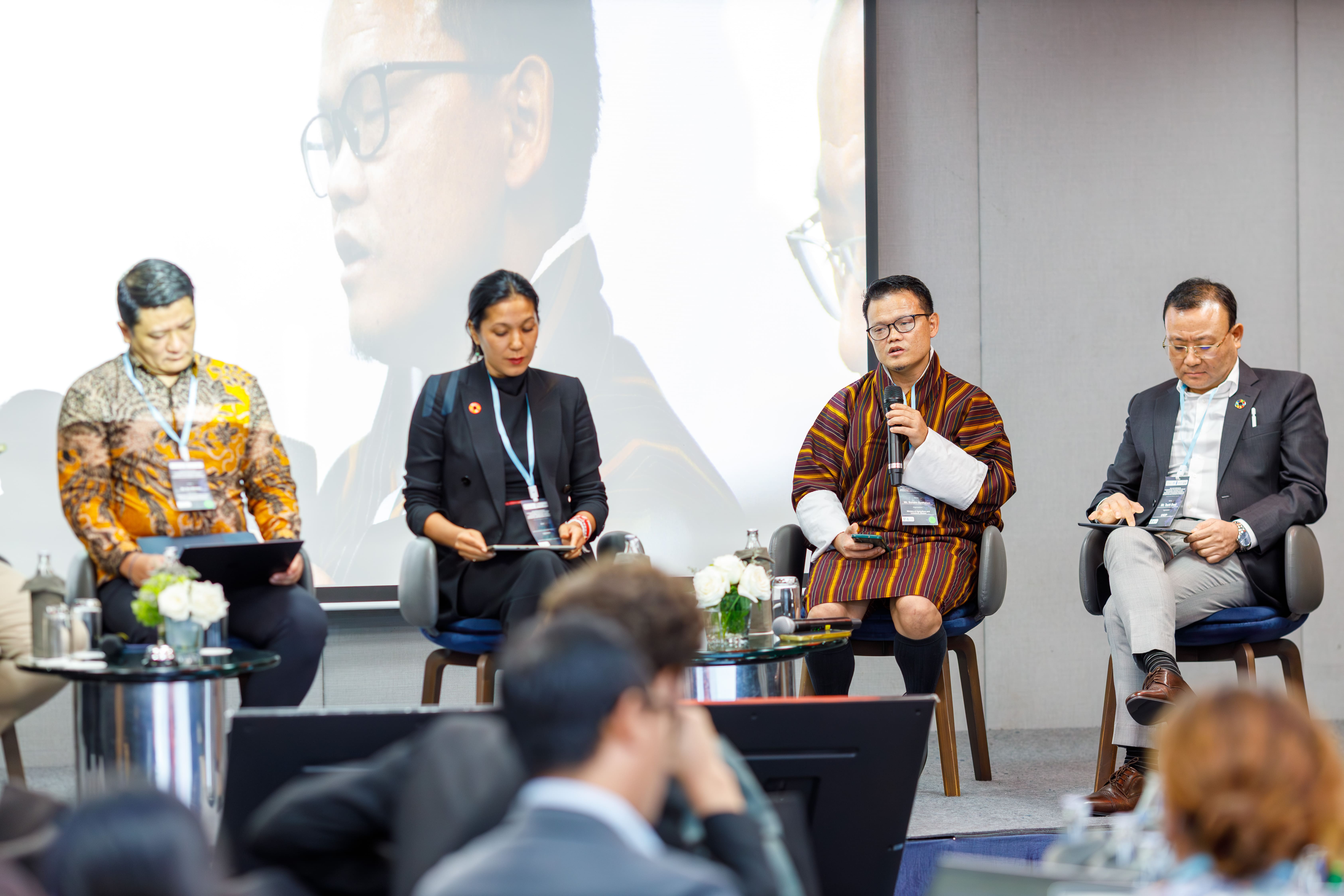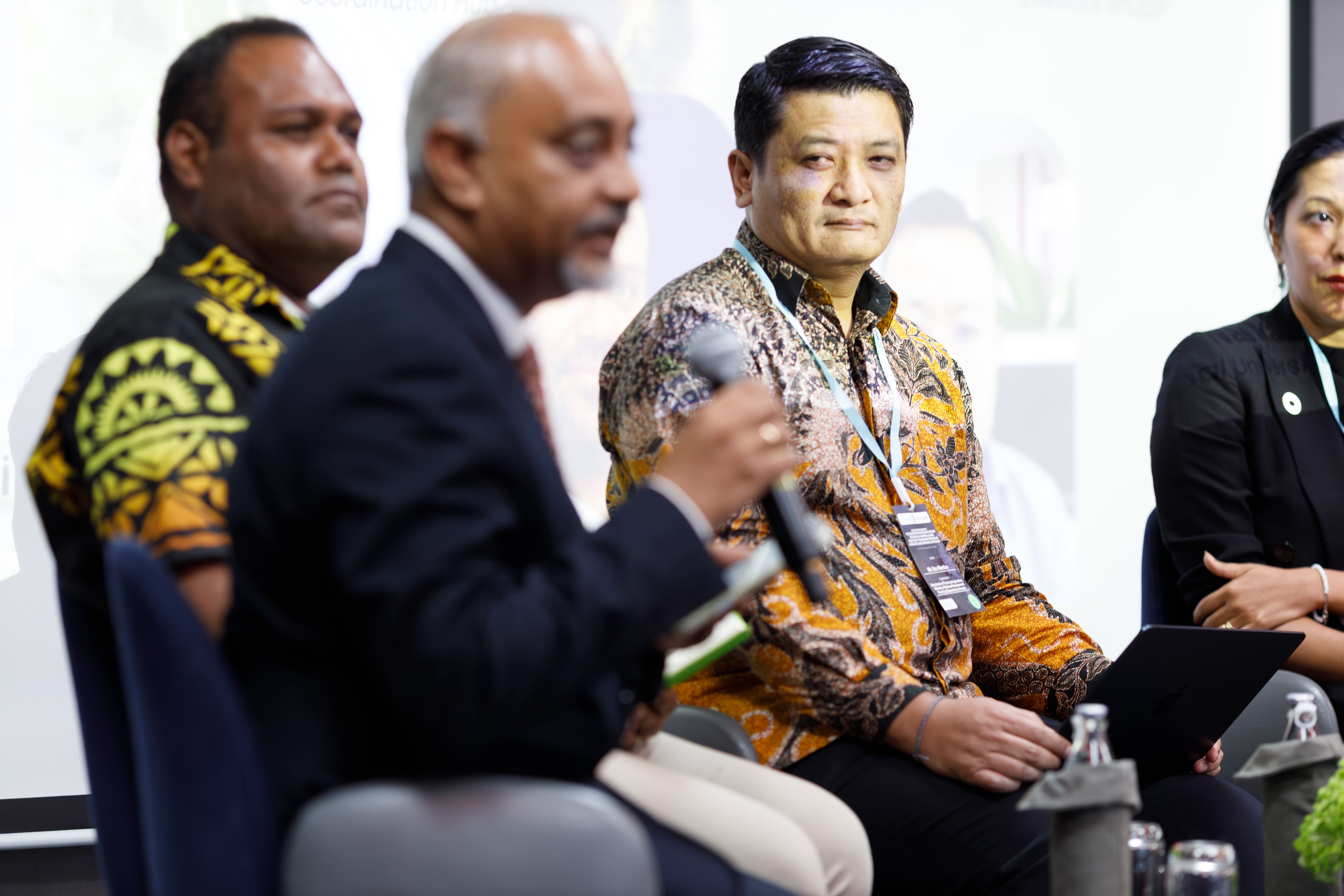Asia-Pacific steps up synergies across food, climate, and biodiversity agendas ahead of COP30
.jpg?sfvrsn=e3c95e6a_5)
Bangkok and Hanoi | 10 October 2025: In a dynamic week for the Asia-Pacific region, the UN Food Systems Coordination Hub engaged in two high-level regional workshops aimed at accelerating integrated action across biodiversity, climate, and agrifood systems agendas – laying the groundwork for collective regional messaging toward COP30.
The two events – the Asia-Pacific Workshop on Biodiversity Framework Implementation (7–10 October, Bangkok), led by UNEP, and the Asia-Pacific Regional Workshop on Scaling Climate Solutions in Agrifood Systems (7–9 October, Hanoi) – brought together governments, UN agencies, farmer organizations, research institutions, and development partners to strengthen collaboration on national implementation of food systems and environmental commitments.

Connecting agendas: Asia-Pacific advances synergies between food systems, biodiversity, and climate action
At the Asia-Pacific Workshop on Accelerating KMGBF Implementation through Integrated and Synergistic Approaches, co-organized by UNEP, UNDP, FAO, the CBD Secretariat, and SPREP, experts and policymakers called for stronger convergence between National Biodiversity Strategies and Action Plans (NBSAPs) and National Food Systems Pathways to accelerate progress under the Kunming-Montreal Global Biodiversity Framework (KMGBF).
Speaking on behalf of the UN Food Systems Coordination Hub regional focal, Ms. Rathana Peou Norbert-Munns emphasized: “Our challenge is not to invent new agendas, but to connect and align the ones we already have.”
Since the 2021 UN Food Systems Summit, over 130 countries have developed National Food Systems Pathways, with 62% embedding climate and biodiversity objectives. Yet in Asia and the Pacific, fewer than 30% explicitly link food systems to biodiversity goals – a missed opportunity to make food systems a driver of ecological recovery and nature-positive growth, noted Ms. Li Jia, Forestry Officer, FAO Regional Office for Asia and the Pacific.
The workshop outcomes reinforce the UNFSS+4 Call to Action on securing convergence and coherence across all public policy areas related to food systems, and align with FAO’s “Four Betters”: Better Production, Better Nutrition, Better Environment, and Better Life.
Regional call and messages for COP30: Momentum building for climate-resilient agrifood systems
In Hanoi, more than 70 representatives from governments, farmer organizations, development partners, and technical institutions convened for the Asia-Pacific Regional Workshop on Scaling Climate Solutions in Agrifood Systems, co-organized by FAO, ASEAN, the Mekong Institute, and IGES, with support from Japan’s Ministry of Agriculture, Forestry and Fisheries. The UN Food Systems Coordination Hub joined as a co-partner alongside CIAT and UNDP.
The workshop focused on carbon market readiness, climate-smart technologies, and investment pathways for resilient agrifood systems – showcasing progress under the Convergence Initiative, launched at COP28. The Initiative bridges food systems transformation with climate and biodiversity goals through alignment with NDCs, NAPs, NBSAPs, and National Food Systems Pathways.
“The Convergence Initiative is about connecting dots – linking climate, food, and biodiversity ambitions under one coherent framework for action,” said Dr. Rathana Peou Norbert-Munns, Senior Agrifood Systems Policy Expert at the UN Food Systems Coordination Hub. “Our goal is to help countries move from fragmented projects to integrated, nationally owned plans that deliver impact across the SDGs and the Paris Agreement.”
A dedicated session co-led by Dr. Dao The Anh, National Convenor of Viet Nam, and Dr. Phommy Inthichack, National Convenor of Lao PDR, emphasized the importance of aligning national priorities through whole-of-government and whole-of-society approaches. Mr. Jarot Indarto, Indonesia’s National Convenor, shared lessons from Indonesia’s implementation of the Convergence Initiative and contributions to the UNFSS+4 Call to Action.
Insights from Indonesia’s Ministry of Agriculture, the Alliance of Diversity International and CIAT, and other partners underscored the importance of data systems, inclusive financing, and locally driven innovation in advancing the Action Agenda on More Resilient, Adaptive, and Sustainable Food Systems.
A regional call to action
As the region prepares for COP30, participants issued a Regional Call for Action, urging:
- Stronger integration of agrifood systems into national adaptation and mitigation actions under the Paris Agreement;
- Simplified, inclusive, and equitable access to climate finance for smallholders, women, and Indigenous communities;
- Strengthened collaboration through regional mechanisms such as ASEAN and ANGA; and
- Greater empowerment of farmer organizations to lead scalable, locally grounded climate solutions.
Building toward COP30 and beyond
Together, the Bangkok and Hanoi workshops highlighted the Asia-Pacific region’s growing momentum to bridge food systems, climate, and biodiversity agendas. The Hub’s participation reinforced its role as a connector across these domains – helping countries and regional bodies turn commitments into convergence-driven implementation.
“From policy to practice, the Asia-Pacific region continues to show that integrated action is possible when partnerships align,” said Dr. Stefanos Fotiou, Director of the UN Food Systems Coordination Hub. “As we look toward COP30, this spirit of convergence will be key to ensuring agrifood systems deliver for people, nature, and climate alike.”

For more information:
Follow: @FoodSystems | @UN Food Systems Coordination Hub
